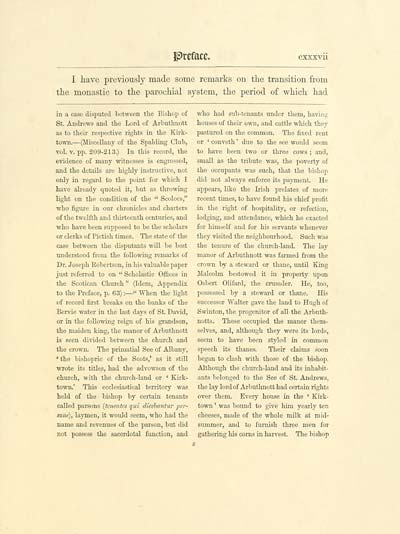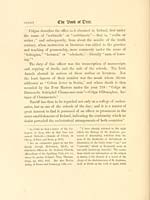Ossian Collection > Book of Deer
(151)
Download files
Complete book:
Individual page:
Thumbnail gallery: Grid view | List view

Preface. exxxvii
I have previously made some remarks on the transition from
the monastic to the parochial system, the period of which had
in a case disputed between the Bishop of
St. Andrews and the Lord of Arbuthnott
as to their respective rights in the Kirk-
town. — (Miscellany of the Spalding Club,
VOL v. pp. 209-213.) In this record, the
evidence of many witnesses is engrossed,
and the details are highly instructive, not
only in regard to the point for which I
have already quoted it, but as throwing
light on the condition of the " Scolocs,"
who figure in our chronicles and charters
of the twelfth and thirteenth centimes, and
who have been supposed to be the scholars
or clerks of Pictish times. The state of the
case between the disputants will be best
understood from the following remarks of
Dr. Joseph Robertson, in his valuable paper
just referred to on " Scholastic Offices in
the Scotican Church " (Idem, Appendix
to the Preface, p. 63) :— " When the light
of record first breaks on the banks of the
Bervie water in the last days of St. David,
or in the following reign of his grandson,
the maiden king, the manor of Arbuthnott
is seen divided between the church and
the crown. The primatial See of Albany,
' the bishopric of the Scots,' as it still
wrote its titles, had the advowson of the
church, with the church-land or ' Kirk-
town.' This ecclesiastical territory was
held of the bishop by certain tenants
called parsons (tenentes qui dicebantiir per-
sona), laymen, it would seem, who had the
name and revenues of the parson, but did
not possess the sacerdotal function, and
who had sub-tenants under them, having
houses of their own, and cattle which they
pastured on the common. The fixed rent
or ' conveth ' due to the see would seem
to have been two or three cows ; and,
small as the tribute was, the poverty of
the occupants was such, that the bishop
did not always enforce its payment. He
appears, like the Irish prelates of more
recent times, to have found his chief profit
in the right of hospitality, or refection,
lodging, and attendance, which he exacted
for himself and for his servants whenever
they visited the neighbourhood. Such was
the tenure of the church-land. The lay
manor of Arbuthnott was farmed from the
crown by a steward or thane, until King
Malcolm bestowed it in property upon
Osbert Olifard, the crusader. He, too,
possessed by a steward or thane. His
successor Walter gave the land to Hugh of
Swinton, the progenitor of all the Arbuth-
notts. These occupied the manor them-
selves, and, although they were its lords,
seem to have been styled in common
speech its thanes. Their claims soon
began to clash with those of the bishop.
Although the church-land and its inhabit-
ants belonged to the See of St. Andrews,
the lay lord of Arbuthnott had certain rights
over them. Every house in the ' Kirk-
town ' was bound to give him yearly ten
cheeses, made of the whole milk at mid-
summer, and to furnish three men for
gathering his corns in harvest. The bishop
I have previously made some remarks on the transition from
the monastic to the parochial system, the period of which had
in a case disputed between the Bishop of
St. Andrews and the Lord of Arbuthnott
as to their respective rights in the Kirk-
town. — (Miscellany of the Spalding Club,
VOL v. pp. 209-213.) In this record, the
evidence of many witnesses is engrossed,
and the details are highly instructive, not
only in regard to the point for which I
have already quoted it, but as throwing
light on the condition of the " Scolocs,"
who figure in our chronicles and charters
of the twelfth and thirteenth centimes, and
who have been supposed to be the scholars
or clerks of Pictish times. The state of the
case between the disputants will be best
understood from the following remarks of
Dr. Joseph Robertson, in his valuable paper
just referred to on " Scholastic Offices in
the Scotican Church " (Idem, Appendix
to the Preface, p. 63) :— " When the light
of record first breaks on the banks of the
Bervie water in the last days of St. David,
or in the following reign of his grandson,
the maiden king, the manor of Arbuthnott
is seen divided between the church and
the crown. The primatial See of Albany,
' the bishopric of the Scots,' as it still
wrote its titles, had the advowson of the
church, with the church-land or ' Kirk-
town.' This ecclesiastical territory was
held of the bishop by certain tenants
called parsons (tenentes qui dicebantiir per-
sona), laymen, it would seem, who had the
name and revenues of the parson, but did
not possess the sacerdotal function, and
who had sub-tenants under them, having
houses of their own, and cattle which they
pastured on the common. The fixed rent
or ' conveth ' due to the see would seem
to have been two or three cows ; and,
small as the tribute was, the poverty of
the occupants was such, that the bishop
did not always enforce its payment. He
appears, like the Irish prelates of more
recent times, to have found his chief profit
in the right of hospitality, or refection,
lodging, and attendance, which he exacted
for himself and for his servants whenever
they visited the neighbourhood. Such was
the tenure of the church-land. The lay
manor of Arbuthnott was farmed from the
crown by a steward or thane, until King
Malcolm bestowed it in property upon
Osbert Olifard, the crusader. He, too,
possessed by a steward or thane. His
successor Walter gave the land to Hugh of
Swinton, the progenitor of all the Arbuth-
notts. These occupied the manor them-
selves, and, although they were its lords,
seem to have been styled in common
speech its thanes. Their claims soon
began to clash with those of the bishop.
Although the church-land and its inhabit-
ants belonged to the See of St. Andrews,
the lay lord of Arbuthnott had certain rights
over them. Every house in the ' Kirk-
town ' was bound to give him yearly ten
cheeses, made of the whole milk at mid-
summer, and to furnish three men for
gathering his corns in harvest. The bishop
Set display mode to: Large image | Transcription
Images and transcriptions on this page, including medium image downloads, may be used under the Creative Commons Attribution 4.0 International Licence unless otherwise stated. ![]()
| Early Gaelic Book Collections > Ossian Collection > Book of Deer > (151) |
|---|
| Permanent URL | https://digital.nls.uk/82541105 |
|---|
| Description | Selected books from the Ossian Collection of 327 volumes, originally assembled by J. Norman Methven of Perth. Different editions and translations of James MacPherson's epic poem 'Ossian', some with a map of the 'Kingdom of Connor'. Also secondary material relating to Ossianic poetry and the Ossian controversy. |
|---|
| Description | Selected items from five 'Special and Named Printed Collections'. Includes books in Gaelic and other Celtic languages, works about the Gaels, their languages, literature, culture and history. |
|---|

